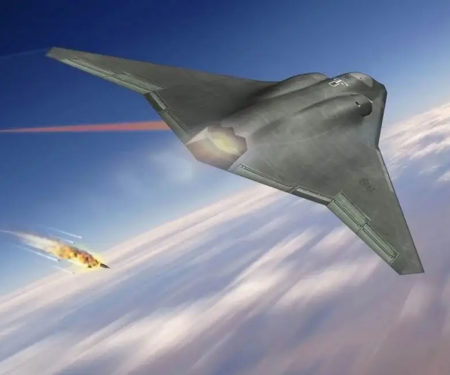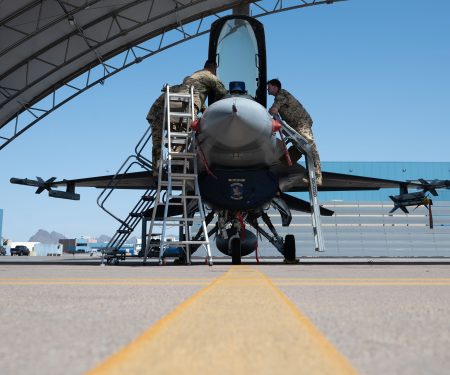F-16s Not a ‘Golden Bullet’ for Ukraine, But They Are an Upgrade, USAFE’s Hecker Says
Air Force Selects 78 Airmen for First Warrant Officer Class in 66 Years
Rebuffing Beijing, US and Philippines Vow to Operate in South China Sea
Air Force Launches New ‘Foundations’ Courses for Enlisted Airmen
Radar Sweep
Iran Says Hamas Leader Ismail Haniyeh Was Assassinated in Tehran
Iran’s paramilitary Revolutionary Guard said Hamas leader Ismail Haniyeh was assassinated in Tehran. No one immediately claimed responsibility for the assassination but suspicion immediately fell on Israel, which has vowed to kill Haniyeh and other leaders of Hamas over the group’s Oct. 7 attack on Israel that killed 1,200 people and saw some 250 others taken hostage.
Boeing’s KC-46 Has a New Top-Tier Deficiency
The Air Force and Boeing identified a new KC-46 deficiency this spring that’s causing damage to the tanker’s air system ducts—adding to the aircraft’s running list of unresolved, high-risk design flaws. The latest deficiency, designated a Category 1 issue based on the degree of risk and operational restrictions it imposes on the aircraft or its operator, involves a faulty fuel pump.
Kendall: The Next Air Force Tanker Could Be Part of an FY25 Quick-Start
The Air Force's next-generation refueling fleet may come down the line sooner than previously expected, and with greater capability, after a potential injection from the service's quick-start authority in fiscal year 2025, service Secretary Frank Kendall said July 30.
A Nearly $3 Billion Shortfall in VA Benefits Is Looming. The Senate Has Proposed a Fix, But Time Is Running Out.
Seeking to avoid a disruption in veterans benefits payments later this year, a bipartisan group of senators has introduced a bill to fix a nearly $3 billion shortfall for disability and education benefits the Department of Veterans Affairs expects to face by October.
Israel Says It Killed Hezbollah Commander in Beirut in Response to Golan Heights Attack
Israel said it killed one of Hezbollah’s top military leaders in an airstrike in Beirut intended as retaliation for an attack on the Israel-controlled Golan Heights that killed 12 young people, a response that came amid fears of a widening war in the Middle East. The strike on Fuad Shukr, the highest-ranking leader of the group to be killed in years, risks sharply escalating tensions between Hezbollah and Israel.
US Carries Out Strike in Iraq as Regional Tensions Worsen
The United States on July 30 carried out a strike in Iraq in self-defense, U.S. officials told Reuters. Iraqi police and medical sources said the strike inside a base south of Baghdad used by Iraq's Popular Mobilization Forces (PMF) killed four members of the group that contains several Iran-aligned armed militias, and wounded four others.
PACAF Commander Tours US-Funded ‘Power Projection Platforms’ in Northern Australia
The top Air Force general in the Pacific evoked a threat posed by China, Russia, and North Korea after inspecting air base improvements July 30 in Australia’s Northern Territory. Gen. Kevin Schneider, a fighter pilot who commands Pacific Air Forces out of Hawaii, discussed nearly $450 million of U.S.-funded base construction in the territory during a meeting with reporters at Royal Australian Air Force Base Darwin.
Trump Would ‘Absolutely’ Scrap Biden’s Air Force One Colors, Adviser Says
If Donald Trump returns to the presidency, he’ll have another shot at achieving a goal that eluded him last time: Changing the colors of Air Force One to his beloved red, white, and dark blue.
Marines Get Green Light To Be ‘Phantoms’ at Air Force’s AI Accelerator
An artificial intelligence hub led by the Department of the Air Force and the Massachusetts Institute of Technology is opening its doors to Marine Corps participation. Until recently, the only Active-duty members of the military tapped to participate in the DAF-MIT AI Accelerator were Airmen and Guardians.
US Needs More Nuclear Subs, Mobile ICBMs, and Tactical Nukes: Heritage Report
The United States should diversify its arsenal of nuclear weapons with additional Columbia-class ballistic missile submarines and a road-mobile variant of the forthcoming Sentinel ICBM, the conservative Heritage Foundation argues in a new report out July 30.
Some Space Leaders Are Starry-Eyed at the Idea of Vice President Mark Kelly
Political leaders in the space sector are over the moon that Sen. Mark Kelly—a former astronaut—has emerged as a top contender to become Vice President Kamala Harris’ running mate.
Quick Satellite Replacement Should Send a Message to China, Air Force No. 2 Says
The Space Force is moving ahead with experiments to quickly replace satellites disabled by enemy activity as it prepares for a potential conflict with China, the service’s undersecretary said July 29. The goal is to have “tactically responsive space systems that allow us to if, for example, a satellite goes down, within five days get a repair package up into orbit to rapidly be able to repair that capability,” Melissa Dalton said during a Brookings Institution event. “That is something that we are demo-ing real time, and I think, is going to provide a really effective demonstration effect to the likes of the [People’s Republic of China].”
Missouri ANG Pilot Becomes First Air Force Pilot to Surpass 2,000 Flight Hours in the B-2
On Jun. 6, 2024, 110th Bomb Squadron Commander Lt. Col. Justin Meyer took off aboard a B-2 from Whiteman Air Force Base, Mo., for a historical mission: during that sortie Meyer became the first Air Force pilot to reach 2,000 flight hours in the Spirit stealth bomber.





